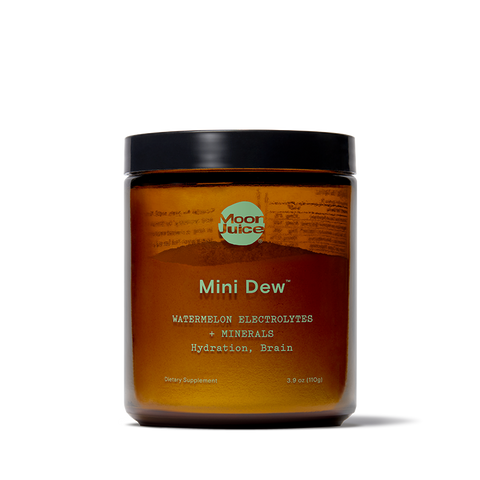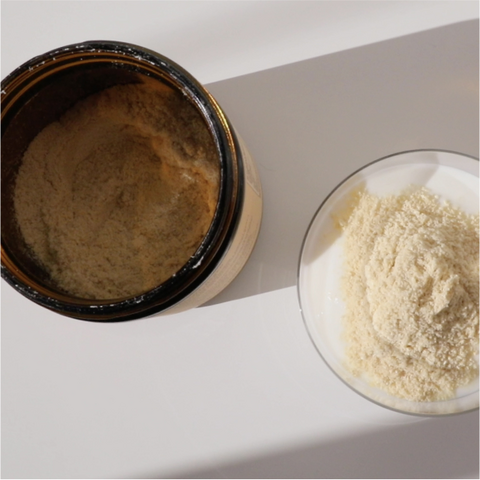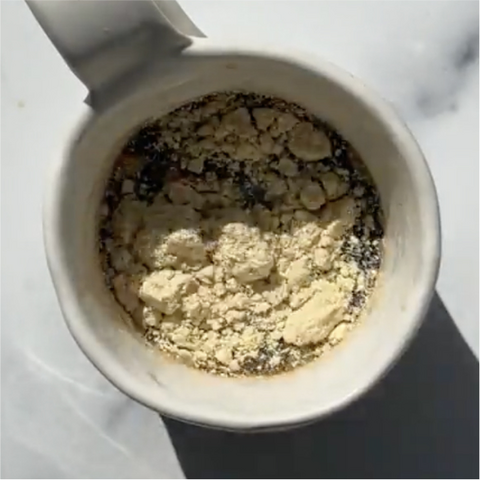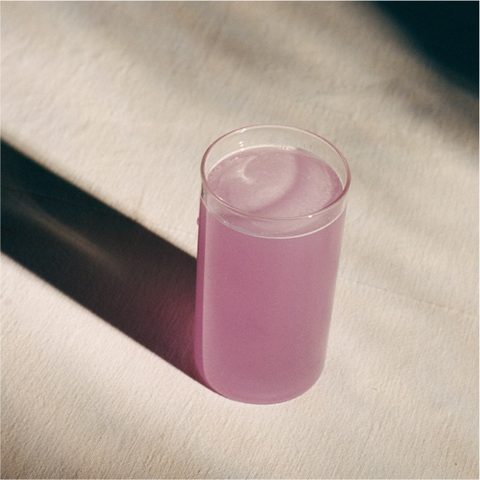Nora is a writer and consultant working with sustainable brands to make an impact. In 2022, she founded Mossy Copy, LLC, a full-service copy studio based in Austin, TX. Her master’s in English is from NYU, and her bachelor’s in the same is from Sewanee. Areas of expertise include wellness, nutrition, style, and beauty.
Electrolytes, or minerals that conduct electricity in your body, are often featured in sports drinks and recovery beverages. But do electrolytes give you energy?
You might already know that electrolytes can help balance hydration, enhance muscle function, and replenish micronutrients. But if you’re looking to drink electrolytes for energy specifically, here’s everything you need to know.
The Body Electric
Electrolytes are particles carrying an electric charge — and when it comes to nutrition, this refers to the minerals that conduct electricity in your bodily fluids.
Key electrolytes found in your body include Calcium, Magnesium, Sodium, Chloride, and Potassium. In addition to other vital functions they perform, when these electrolytes dissolve in water, they carry a positive or negative electric charge. This electricity helps deliver messages between cells to regulate chemical reactions in the body, helping you maintain chemical balance within. Importantly, electrolytes help you maintain balanced hydration. Sodium and Potassium especially are needed for staying adequately hydrated.
How Do Electrolytes Help Your Energy Levels?
Calories are the most straightforward source of energy: our bodies break down the food we consume into adenosine triphosphate, or ATP, for use as cellular currency.
When feeling weary, caffeine and other stimulants are another obvious way to get energized. Instead of directly fueling your body with ATP, caffeine blocks certain sleepiness receptors in your brain, increasing brain and nervous system activity that makes you feel more alert.
Electrolytes don’t directly contain energy in the caloric sense or stimulate you in the way that caffeine does. But without proper hydration and electrolytes, your body isn’t able to synthesize those molecules of ATP that act as energy for your cells. So if low energy is the result of an electrolyte deficiency, replenishing electrolytes could help your body produce the energy it needs.
Here are some key ways that specific electrolytes influence energy production:
Potassium
Our bodies can recycle ATP to reuse in the future, a process that requires cellular communication via Potassium channels. These channels prompt your body to secrete insulin, a hormone that helps regulate glucose in your blood (glucose being a type of stored energy). Potassium is an essential mineral that also helps optimize hydration, important for ATP production.
Sodium
Sodium plays a key role in maintaining the body’s fluid balance and is integral to the function of Sodium-Potassium pumps, which regulate the electrical potential across cell membranes. This pump activity is essential for nerve impulse transmission and muscle contractions, both of which influence ATP utilization.
Calcium
Calcium serves as a secondary messenger in numerous cellular signaling pathways. It’s used to activate many enzymes that are needed for ATP production. Without enough Calcium, these enzymes may be unable to activate and produce energy.
Magnesium
Magnesium is an essential mineral cofactor for many enzymes involved in ATP production through cellular respiration. It helps facilitate the conversion of glucose and other energy substrates into ATP, making it a direct contributor to energy production in the body. Many people are deficient in magnesium, so you may want to consider taking a Magnesium powder supplement if you have low energy levels.
How to Take Electrolytes for Energy
If you’re feeling blah, electrolyte imbalance could be the root cause. A daily electrolyte supplement can help ensure you’re getting an optimal intake. Before reaching for an energy drink or sports drink, check the label for added sugar and other hidden junk. Many drinks that have electrolytes in the markets are also filled with unhealthy ingredients, so be sure to do your research ahead of time if you’re looking to fix an electrolyte imbalance.
Turns out 90% of the U.S. has a mineral imbalance or deficiency and 75% are chronically dehydrated, which can manifest as brain fog and fatigue. Staying hydrated by drinking water is important, but electrolyte levels also play a critical role, helping you stay nourished and quenched.
If you have an active lifestyle, it’s also recommended that you hydrate with an electrolyte drink instead of just water during intense workouts or ones that last over 30 minutes.
During exercise, saunas, sickness, injury, or travel, it’s especially important to pay attention to electrolyte intake, since dehydration and loss of fluids can deplete you of electrolytes and imperil your body’s internal energy production.
Mini Dew™ is a 2 in 1 hydrating electrolyte drink powder with minerals for hydration and brain function.* A microplastic-free pink salt electrolyte supports optimal hydration by maintaining water balance in and around cells.* Ionic trace minerals give the body the elements it needs to feel good and energized, while chelated essential minerals enhance cognitive performance and help reduce brain fog.* Mix 1 teaspoon of Mini Dew™ into 12 ounces of water every day for your own homemade electrolyte drink.
Takeaways
If you’re low on energy, you might have already tried getting better sleep, consuming efficient calories to fuel your body, or compensating with caffeine and energy drinks. But if your body has electrolyte imbalances, you might still struggle to have enough energy. That’s why taking an electrolyte supplement can be very beneficial.
While electrolytes don’t give you energy in the traditional sense, they help your body produce ATP to use as fuel for your workouts, workday, and all of life’s activities. Shop Mini Dew™ today to start experiencing the benefits of electrolytes for energy.
Sign Up, Nerd Out
Get wellness tips, education, and recipes
delivered straight to your inbox.
Get wellness tips, education,
and recipes delivered
straight to your inbox.
Electrolytes, or minerals that conduct electricity in your body, are often featured in sports drinks and recovery beverages. But do electrolytes give you energy?
You might already know that electrolytes can help balance hydration, enhance muscle function, and replenish micronutrients. But if you’re looking to drink electrolytes for energy specifically, here’s everything you need to know.
The Body Electric
Electrolytes are particles carrying an electric charge — and when it comes to nutrition, this refers to the minerals that conduct electricity in your bodily fluids.
Key electrolytes found in your body include Calcium, Magnesium, Sodium, Chloride, and Potassium. In addition to other vital functions they perform, when these electrolytes dissolve in water, they carry a positive or negative electric charge. This electricity helps deliver messages between cells to regulate chemical reactions in the body, helping you maintain chemical balance within. Importantly, electrolytes help you maintain balanced hydration. Sodium and Potassium especially are needed for staying adequately hydrated.
How Do Electrolytes Help Your Energy Levels?
Calories are the most straightforward source of energy: our bodies break down the food we consume into adenosine triphosphate, or ATP, for use as cellular currency.
When feeling weary, caffeine and other stimulants are another obvious way to get energized. Instead of directly fueling your body with ATP, caffeine blocks certain sleepiness receptors in your brain, increasing brain and nervous system activity that makes you feel more alert.
Electrolytes don’t directly contain energy in the caloric sense or stimulate you in the way that caffeine does. But without proper hydration and electrolytes, your body isn’t able to synthesize those molecules of ATP that act as energy for your cells. So if low energy is the result of an electrolyte deficiency, replenishing electrolytes could help your body produce the energy it needs.
Here are some key ways that specific electrolytes influence energy production:
Potassium
Our bodies can recycle ATP to reuse in the future, a process that requires cellular communication via Potassium channels. These channels prompt your body to secrete insulin, a hormone that helps regulate glucose in your blood (glucose being a type of stored energy). Potassium is an essential mineral that also helps optimize hydration, important for ATP production.
Sodium
Sodium plays a key role in maintaining the body’s fluid balance and is integral to the function of Sodium-Potassium pumps, which regulate the electrical potential across cell membranes. This pump activity is essential for nerve impulse transmission and muscle contractions, both of which influence ATP utilization.
Calcium
Calcium serves as a secondary messenger in numerous cellular signaling pathways. It’s used to activate many enzymes that are needed for ATP production. Without enough Calcium, these enzymes may be unable to activate and produce energy.
Magnesium
Magnesium is an essential mineral cofactor for many enzymes involved in ATP production through cellular respiration. It helps facilitate the conversion of glucose and other energy substrates into ATP, making it a direct contributor to energy production in the body. Many people are deficient in magnesium, so you may want to consider taking a Magnesium powder supplement if you have low energy levels.
How to Take Electrolytes for Energy
If you’re feeling blah, electrolyte imbalance could be the root cause. A daily electrolyte supplement can help ensure you’re getting an optimal intake. Before reaching for an energy drink or sports drink, check the label for added sugar and other hidden junk. Many drinks that have electrolytes in the markets are also filled with unhealthy ingredients, so be sure to do your research ahead of time if you’re looking to fix an electrolyte imbalance.
Turns out 90% of the U.S. has a mineral imbalance or deficiency and 75% are chronically dehydrated, which can manifest as brain fog and fatigue. Staying hydrated by drinking water is important, but electrolyte levels also play a critical role, helping you stay nourished and quenched.
If you have an active lifestyle, it’s also recommended that you hydrate with an electrolyte drink instead of just water during intense workouts or ones that last over 30 minutes.
During exercise, saunas, sickness, injury, or travel, it’s especially important to pay attention to electrolyte intake, since dehydration and loss of fluids can deplete you of electrolytes and imperil your body’s internal energy production.
Mini Dew™ is a 2 in 1 hydrating electrolyte drink powder with minerals for hydration and brain function.* A microplastic-free pink salt electrolyte supports optimal hydration by maintaining water balance in and around cells.* Ionic trace minerals give the body the elements it needs to feel good and energized, while chelated essential minerals enhance cognitive performance and help reduce brain fog.* Mix 1 teaspoon of Mini Dew™ into 12 ounces of water every day for your own homemade electrolyte drink.
Takeaways
If you’re low on energy, you might have already tried getting better sleep, consuming efficient calories to fuel your body, or compensating with caffeine and energy drinks. But if your body has electrolyte imbalances, you might still struggle to have enough energy. That’s why taking an electrolyte supplement can be very beneficial.
While electrolytes don’t give you energy in the traditional sense, they help your body produce ATP to use as fuel for your workouts, workday, and all of life’s activities. Shop Mini Dew™ today to start experiencing the benefits of electrolytes for energy.














